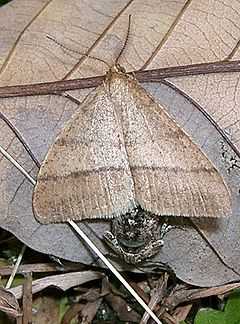Bistonini
| Bistonini | |
|---|---|
 | |
| Mating Pachyerannis obliquaria. Large-winged male above, stub-winged female below. | |
| Scientific classification | |
| Kingdom: | Animalia |
| Phylum: | Arthropoda |
| Subphylum: | Hexapoda |
| Class: | Insecta |
| Order: | Lepidoptera |
| (unranked): | Macrolepidoptera |
| Superfamily: | Geometroidea |
| Family: | Geometridae |
| Subfamily: | Ennominae |
| Tribe: | Bistonini Stephens, 1850 |
| Genera | |
|
See text | |
| Synonyms | |
|
[1] | |
The Bistonini are a tribe of geometer moths in subfamily the Ennominae. As numerous ennomine genera have not yet been assigned to a tribe,[2] the genus list is preliminary. In addition, the entire tribe is sometimes[3] merged into a much-expanded Boarmiini. In other treatments,[4] the Erannini are included in the present group.
They overall resemble the Boarmiini, which are certainly closely related. Bistonini tend to retain more plesiomorphic traits (they are rather basal in the expanded Boarmiini) and contain many species that are very large and hairy by geometer moth standards, somewhat resembling Arctiidae.[5]
Selected genera and species
- Agriopis
- Spring Usher, Agriopis leucophaearia
- Dotted Border, Agriopis marginaria
- Almabiston
- Amorphogynia
- Apocheima
- Biston
- Chondrosoma
- Cochisea
- Hypagyrtis
- Larerannis
- Lycia
- Brindled Beauty, Lycia hirtaria
- Megabiston
- Microbiston
- Nyssiodes
- Pachyerannis
- Paleacrita
- Spring Cankerworm, Paleacrita vernata
- Phigaliohybernia
- Protalcis
- Pterotocera
Footnotes
References
| Wikimedia Commons has media related to Bistonini. |
- Forum Herbulot (2008): Family group names in Geometridae. Retrieved 2008-JUL-22.
- Holloway, J.D. (1994): The Moths of Borneo: Family Geometridae, Subfamily Ennominae. London.
- Savela, Markku (2008): Markku Savela's Lepidoptera and some other life forms: Ennominae. Version of 2010-JUN-24. Retrieved 2011-JAN-12.
- Young, Catherine J. (2008): Characterisation of the Australian Nacophorini using adult morphology, and phylogeny of the Geometridae based on morphological characters. Zootaxa 1736: 1-141. PDF abstract and excerpt